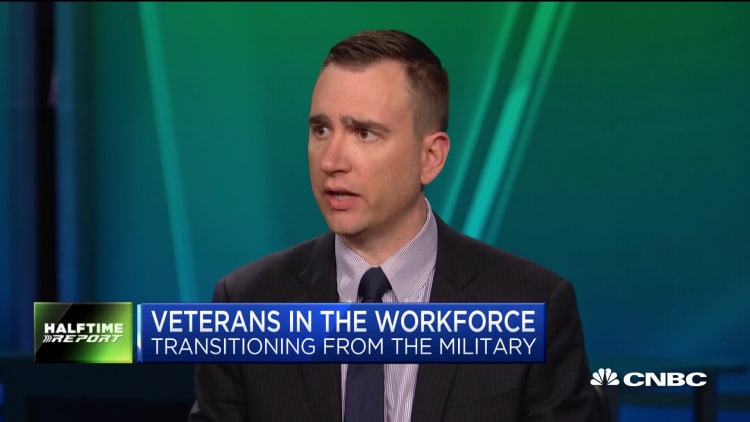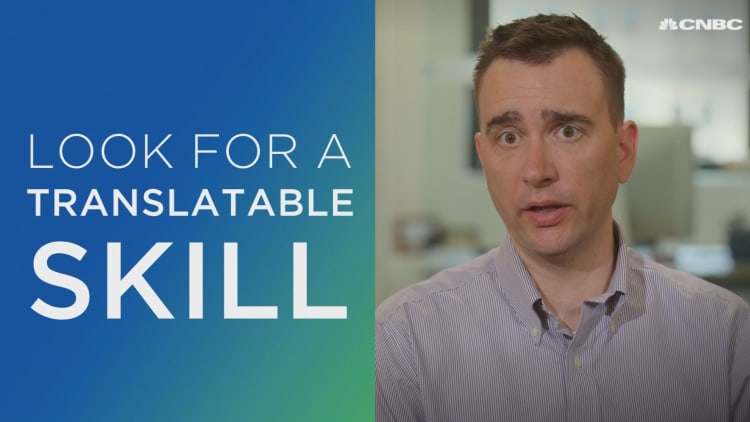
Switching careers is hard, but it can be particularly daunting for soldiers transitioning into civilian life.
They face a new reality that is very different from the one they are leaving behind. In fact, many feel they are at a disadvantage when it comes to finding work because they are starting over, a 2018 report found.
"Leaving the Army is a very difficult thing. They literally train you. They move your goods when you move. And they tell you what to wear and what time you show up for work," said Bill Sweet, chief financial officer of financial planning firm Ritholtz Wealth.
Sweet understands those challenges. He served in the U.S. Army, rising to the rank of captain before leaving in 2007. During his service, he was stationed in Iraq during the Iraq War and earned a Bronze Star Medal for his actions.
Sweet was also fortunate enough to be assigned as a tax assistance officer for his battalion during his last year in active duty. That gave him a skill that ultimately lead him to his current career in finance.
You think you're alone, you think you're going to do this for the first time. No. There is someone who has walked [in] those shoes in front of you.Bill SweetCFO, Ritholtz Wealth
Now, he wants to help other vets find success after their military careers. And there are many. Each year, about 200,000 service members return to their civilian communities.
Here are three key things veterans should focus on, according to Sweet.

Look for a translatable skill
Driving a tank in the desert probably isn't going to translate to a job in New York City, Sweet said.
However, there are other ways to build an expertise and "ultimately take that with you in your toolkit, out to the civilian world," he said.
"Tax was my avenue. But there's a lot of translatable skills within a military organization."
Those can be things like finance, public affairs and logistics, all of which are great points for your resume.
Ask for help
In the military, active service members are taught to be self-reliant.
However, when it comes to transitioning into the civilian workforce, they need to ask for help, Sweet said.
"In the military, you think you're alone. You think you're going to do this for the first time. No," he said. "There's somebody that's walked [in] those shoes in front of you. And it's a matter of finding them."
More from Invest in You:
How military members can protect themselves from predatory lenders
Military spouses can take control of work, retirement wealth
Programs that help military families with complex financial matters
There are a number of organizations that want to help and hire veterans of the military. Fourblock, a nonprofit that offers vets free semester-long, university accredited courses is one of them.
Veterans on Wall Street or VoWS, is another organization. VoWS connects military talent with Wall Street banks to get veterans into the industry.
Find a mentor
When trying to land a job or if you find yourself in a new one, try to find a mentor who can guide you by offering advice and helping you get to know the ins and outs of a given field or organization.
It will not only help you land a job or advance your career, it can also help you enjoy your work. According to a recent CNBC/SurveyMonkey survey, 9 in 10 workers (91%) said having a mentor made them significantly happier with their jobs.
Sweet credits his mentors, Ritholtz CEO Josh Brown and Ritholtz chairman and CIO Barry Ritholtz, for helping him succeed. Sweet landed at the firm several years after leaving the Army, with just one financial job under his belt.
"They were willing to take a big chance on a veteran with not a ton of experience in financial services," he said. "I will always be grateful for that."

Disclosure: NBCUniversal and Comcast Ventures are investors in Acorns.







